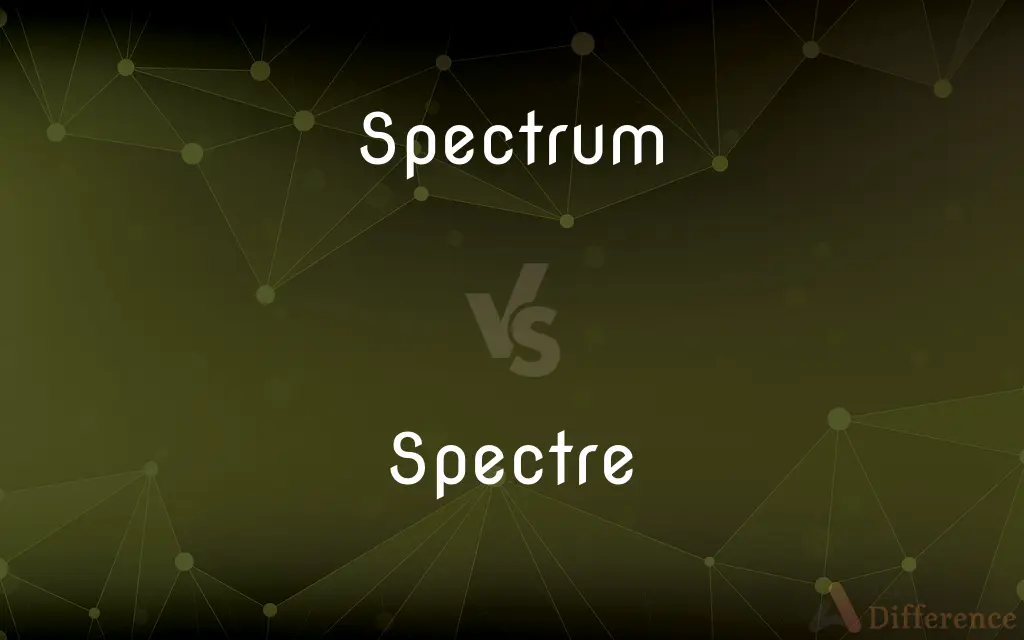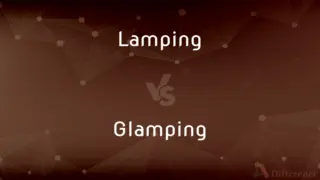Spectrum vs. Spectre — What's the Difference?
Edited by Tayyaba Rehman — By Fiza Rafique — Updated on April 27, 2024
Spectrum refers to a range of different things, often seen in contexts like light or ideas, whereas spectre means a ghost or something widely feared.

Difference Between Spectrum and Spectre
Table of Contents
ADVERTISEMENT
Key Differences
Spectrum typically describes a band of colors, as seen in a rainbow, produced by separation of the components of light by their different degrees of refraction, such as in a prism. Whereas, spectre is used to denote a ghostly appearance or a phantom, often linked to fear or a troubling image in literature and popular culture.
Spectrum is also used figuratively to represent a range or series of similar things or qualities, especially when they are distinct yet closely related. On the other hand, spectre can metaphorically describe an idea or fear that haunts or troubles the mind, like the spectre of unemployment haunting an economy.
In scientific contexts, spectrum is a term used to describe the continuous range of values or qualities that an object or phenomenon can exhibit, like the electromagnetic spectrum or spectrum of opinion. Whereas, spectre does not have a scientific application and is strictly used in literary or colloquial contexts.
Spectrum can further be divided into specific types like emission spectrum, absorption spectrum, and others, which help scientists understand the properties of different materials and phenomena. On the other hand, spectre does not offer such variations and is generally limited to its figurative or ghostly references.
In everyday language, "spectrum" can be applied to describe a variety of continua, from political ideologies to autism spectrum disorder, illustrating a wide or complete range of types. Whereas, "spectre" is mostly used in a cautionary or ominous context, like referring to something undesirable that is perceived as likely to occur.
ADVERTISEMENT
Comparison Chart
Definition
A range of different items or a band of colors
A ghost or phantom
Usage Context
Scientific, cultural, metaphorical
Literary, metaphorical
Varieties
Electromagnetic, emission, absorption, etc.
Lacks varieties, generally singular in nature
Figurative Meaning
Wide range of ideas or possibilities
Fear or an idea that haunts
Example in a Sentence
The spectrum of opinions on this topic is vast.
The spectre of war looms over the region.
Compare with Definitions
Spectrum
In physics, the range over which wavelengths of electromagnetic radiation extend.
The electromagnetic spectrum includes radio waves and gamma rays.
Spectre
Something widely feared as a possible unpleasant or dangerous occurrence.
The spectre of global warming affects all of us.
Spectrum
A band of colors, as seen in a rainbow, produced by the separation of the components of light by their different degrees of refraction.
He used a prism to show the spectrum of light.
Spectre
A ghostly apparition, a phantom.
The old castle is said to be haunted by the spectre of a former king.
Spectrum
In general use, a condition that is not limited to a specific set of values but can vary infinitely within a continuum.
The symptoms of the disease can appear across a broad spectrum.
Spectre
In literary terms, a visible incorporeal spirit, especially one of a terrifying nature.
The novel features a spectre that foretells doom.
Spectrum
A tool used in many fields to classify something in terms of its position on a scale between two extreme points.
The survey categorized voters on a spectrum from liberal to conservative.
Spectre
A source of terror or dread.
The spectre of nuclear war is an ever-present fear for many.
Spectrum
A range of similar things or qualities.
The political spectrum ranges from left to right.
Spectre
An image or representation of something disturbing or frightening.
The spectre of poverty haunts the economically disadvantaged regions.
Spectrum
A spectrum (plural spectra or spectrums) is a condition that is not limited to a specific set of values but can vary, without steps, across a continuum. The word was first used scientifically in optics to describe the rainbow of colors in visible light after passing through a prism.
Spectre
A ghost
A dread of spectres and witches affected every aspect of daily life
Spectrum
The entire range over which some measurable property of a physical system or phenomenon can vary, such as the frequency of sound, the wavelength of electromagnetic radiation, or the mass of specific kinds of particles.
Spectre
Variant of specter.
Spectrum
A specific portion of such a range
The infrared spectrum.
Spectre
Standard spelling of specter
Spectrum
A characteristic distribution of phenomena manifested over such a range
The emission spectrum for sodium vapor.
Spectre
See Specter.
Spectrum
A graphic representation of such a distribution; a spectrogram.
Spectre
A ghostly appearing figure;
We were unprepared for the apparition that confronted us
Spectrum
A band of colors produced when the wavelengths making up white light are separated, as when light passes through a prism or strikes drops of water.
Spectre
A mental representation of some haunting experience;
He looked like he had seen a ghost
It aroused specters from his past
Spectrum
A range of radio frequencies assigned by a regulatory agency for use by a given group or organization.
Spectrum
A range of values of a quantity or set of related quantities
The income spectrum.
Spectrum
A sequence or range of related qualities, ideas, activities, entities, or phenomena
The whole spectrum of 20th-century thought.
The spectrum of genes involved in the immune response.
Spectrum
A range; a continuous, infinite, one-dimensional set, possibly bounded by extremes.
Spectrum
Specifically, a range of colours representing light (electromagnetic radiation) of contiguous frequencies; hence electromagnetic spectrum, visible spectrum, ultraviolet spectrum, etc.
Spectrum
The autism spectrum.
Spectrum
(chemistry) The pattern of absorption or emission of radiation produced by a substance when subjected to energy (radiation, heat, electricity, etc.).
Spectrum
The set of eigenvalues of a matrix.
Spectrum
Of a bounded linear operator A, the set of scalar values λ such that the operator A—λI, where I denotes the identity operator, does not have a bounded inverse; intended as a generalisation of the linear algebra sense.
Spectrum
The set, denoted Spec(R), of all prime ideals of a given ring R, commonly augmented with a Zariski topology and considered as a topological space.
Stone space
Spectrum
(obsolete) Specter, apparition.
Spectrum
The image of something seen that persists after the eyes are closed.
Spectrum
An apparition; a specter.
Spectrum
The several colored and other rays of which light is composed, separated by the refraction of a prism or other means, and observed or studied either as spread out on a screen, by direct vision, by photography, or otherwise. See Illust. of Light, and Spectroscope.
Spectrum
An ordered array of the components of an emission or wave
Spectrum
Broad range of related values or qualities or ideas or activities
Common Curiosities
What is the primary meaning of spectrum?
Spectrum primarily refers to a range of different things or a band of colors seen when light is dispersed.
What does spectre mean?
Spectre usually means a ghost, phantom, or something widely feared.
Is spectre used in everyday conversation?
Spectre is less common in daily conversation and is usually used to describe fears or to evoke a haunting image.
What is the impact of using the term spectre in conversation?
Using the term spectre typically adds a dramatic or ominous tone, suggesting fear or apprehension.
Is there a connection between spectrum and spectre in any context?
There is no direct connection; they are used in very different contexts.
Can spectre be used positively?
Spectre is almost exclusively used in negative or haunting contexts.
Can spectrum be used in scientific contexts?
Yes, spectrum is widely used in scientific contexts, such as describing different types of electromagnetic radiation.
What are the types of spectrum in science?
In science, types of spectrum include emission, absorption, and continuous spectrum.
What is an example of spectrum used in politics?
Political spectrum refers to the classification of political positions from liberal to conservative.
What might "a spectrum of activities" imply?
This implies a variety of activities covering a broad range, from leisurely to intensive.
How do the meanings of spectrum and spectre differ in terms of fear?
Spectrum may involve a range of fears when used metaphorically, whereas spectre directly symbolizes specific fears or threats.
Can spectrum have a metaphorical meaning?
Yes, spectrum is often used metaphorically to describe a wide range of ideas or qualities.
How does the use of spectrum in medicine relate to its general meaning?
In medicine, spectrum often refers to the range of symptoms or manifestations of a condition, aligning with its general meaning of a continuum.
How is spectre used in literature?
In literature, spectre is often used to symbolize fear or to represent ghostly characters.
How does the scientific use of spectrum help in understanding phenomena?
It helps categorize and understand the various properties of materials and phenomena based on the range they exhibit, such as light absorption or emission characteristics.
Share Your Discovery

Previous Comparison
Lamping vs. Glamping
Next Comparison
Industrial vs. CommercialAuthor Spotlight
Written by
Fiza RafiqueFiza Rafique is a skilled content writer at AskDifference.com, where she meticulously refines and enhances written pieces. Drawing from her vast editorial expertise, Fiza ensures clarity, accuracy, and precision in every article. Passionate about language, she continually seeks to elevate the quality of content for readers worldwide.
Edited by
Tayyaba RehmanTayyaba Rehman is a distinguished writer, currently serving as a primary contributor to askdifference.com. As a researcher in semantics and etymology, Tayyaba's passion for the complexity of languages and their distinctions has found a perfect home on the platform. Tayyaba delves into the intricacies of language, distinguishing between commonly confused words and phrases, thereby providing clarity for readers worldwide.














































